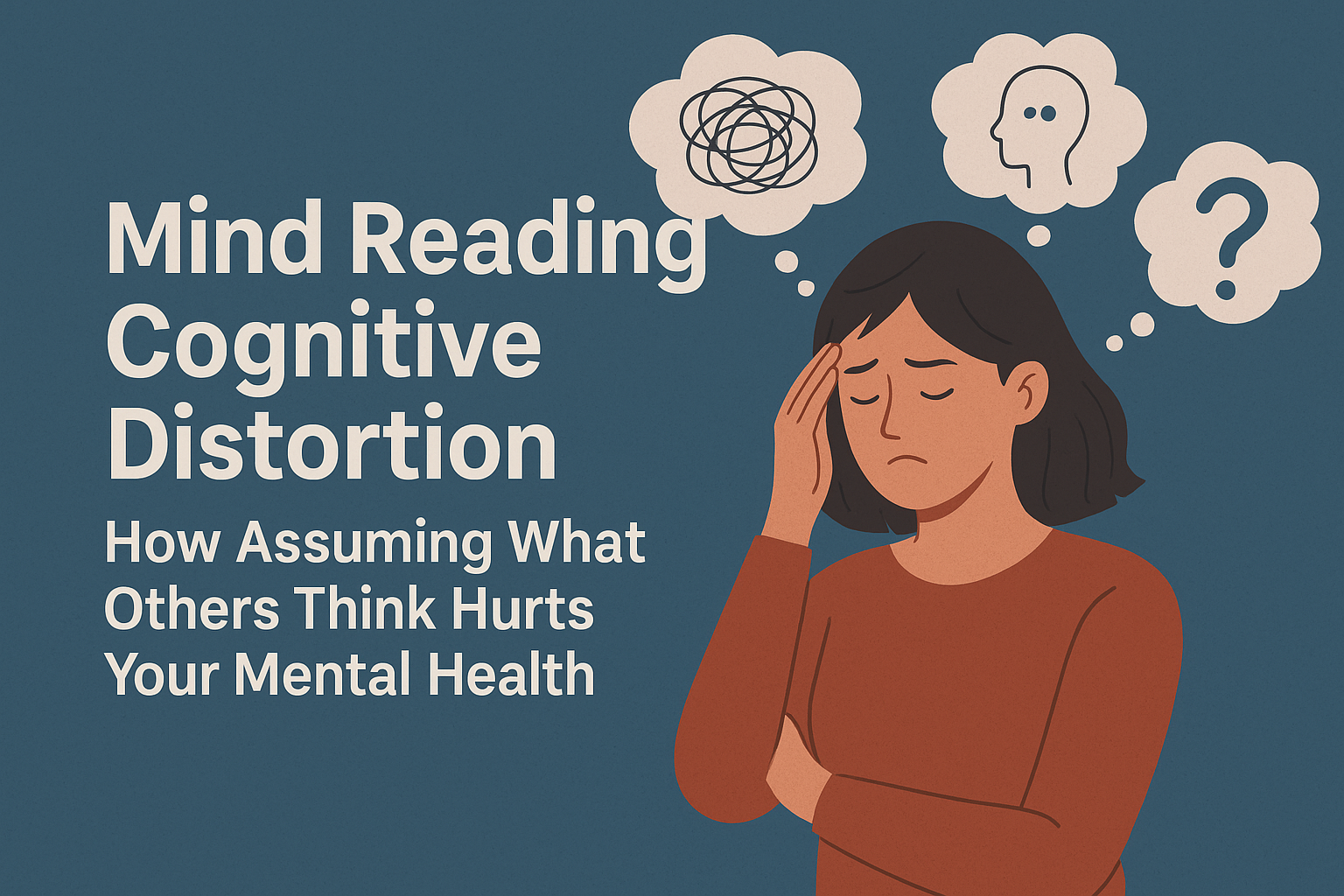Mind Reading Cognitive Distortion: How Assuming What Others Think Hurts Your Mental Health
Have you ever caught yourself thinking, “They must be judging me” or “She probably thinks I’m not good enough”?
If so, you’ve experienced what psychologists call Mind Reading — a common cognitive distortion that can seriously affect your confidence and mental health.
This article explains what the mind reading distortion is, how it harms your mental well-being, and how to stop assuming what others think about you.
What Is Mind Reading Cognitive Distortion?
The Mind Reading Cognitive Distortion occurs when you assume you know what others are thinking — usually something negative about you — without any real evidence.
Examples include:
- “My boss didn’t smile today; she must be unhappy with my work.”
- “My friend didn’t reply; he must be ignoring me.”
- “People probably think I’m awkward in social situations.”
This distortion is part of Cognitive Behavioral Therapy (CBT) principles, which identify unhelpful thought patterns that distort reality and contribute to anxiety and depression.
Why We Fall Into the Mind Reading Trap
Humans are naturally social and wired to interpret others’ emotions. However, when our self-esteem is low or we’re under stress, our brains start filling in the blanks with negative assumptions.
This often happens because of:
- Fear of rejection or criticism
- Past negative experiences
- Perfectionism or social anxiety
- Low self-worth
Essentially, mind reading acts as a self-defense mechanism — but instead of protecting you, it often makes you feel worse.
How Mind Reading Hurts Your Mental Health
Constantly trying to guess what others think creates emotional exhaustion. Here’s how it damages your mental well-being:
- Increases Anxiety
You become hyper-focused on others’ reactions, reading hidden meanings in every word or gesture. - Destroys Self-Confidence
Believing others think poorly of you lowers your self-esteem and prevents you from expressing your authentic self. - Causes Miscommunication
You might act defensively or withdraw, leading to misunderstandings and strained relationships. - Triggers Overthinking
Instead of living in the present, your mind replays interactions, searching for “proof” that someone disapproves of you.
Signs You’re Engaging in Mind Reading
Ask yourself:
- Do I often assume what others feel without asking them?
- Do I think people are judging me even when they haven’t said anything?
- Do I interpret neutral behavior as rejection?
If you said yes to most of these, you might be stuck in the mind reading loop.
How to Stop Mind Reading
Breaking free from this cognitive distortion takes awareness and practice. Here’s how:
1. Challenge Your Thoughts
Ask yourself:
- Do I have solid evidence for this belief?
- Could there be another explanation for their behavior?
2. Communicate Directly
Instead of guessing, ask. Open communication helps replace assumption with clarity.
3. Practice Mindfulness
Mindfulness helps you observe thoughts without judgment, allowing you to notice distorted thinking before it takes over.
4. Build Self-Esteem
The more confident you are, the less you’ll care about others’ opinions. Focus on your achievements and values.
5. Use CBT Techniques
Journaling your thoughts and reframing negative assumptions are key tools from Cognitive Behavioral Therapy that can help you see reality more clearly.
Example of Reframing a Mind Reading Thought
Before: “She didn’t reply to my text — she must be angry.”
After: “There could be many reasons she hasn’t replied. Maybe she’s busy or didn’t see it yet.”
By reframing, you stop assigning negative meanings to neutral events.
The Psychology Behind Mind Reading
Psychologists link mind reading to cognitive bias — specifically, the negativity bias, where people focus more on negative interpretations than positive or neutral ones.
Over time, this pattern can contribute to:
- Social anxiety disorder (SAD)
- Depressive thinking
- Low emotional resilience
Recognizing and correcting this bias is essential for mental well-being.
Final Thoughts
Mind reading may seem harmless, but over time, it fuels anxiety, isolation, and self-doubt. Remember — you can’t truly know what someone else is thinking.
The key to better mental health is challenging your assumptions, communicating clearly, and focusing on facts, not fears.
When you stop trying to read minds, you start freeing your own.

